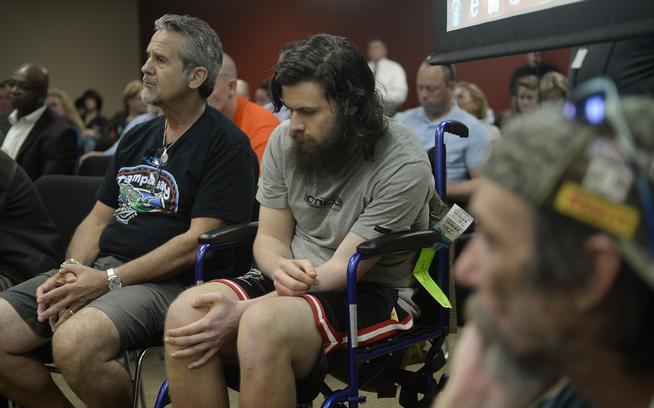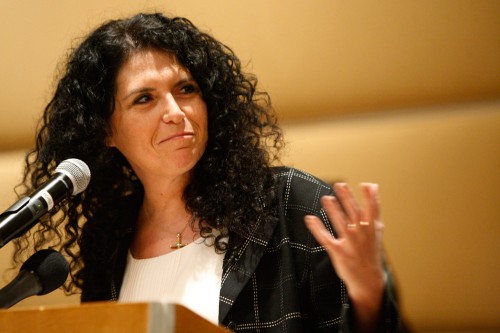In the past three months, the dominoes appeared to be falling in favor of proponents for the use of medical marijuana to treat symptoms of post-traumatic stress disorder.
In May, the U.S House of Representatives and Senate separately voted to allow Veterans Affairs doctors to discuss medical marijuana with their patients as an option for treatment.
Then in June, PTSD was among 20 qualifying conditions listed under Ohio’s medical marijuana legislation signed into law by Gov. John Kasich.
Also in June, a Cook County, Ill., judge ordered that the state health department include PTSD as a qualifying condition; and New Jersey’s state Assembly passed a PTSD-qualifying bill.
And earlier this month, Rhode Island Gov. Gina Raimondo signed a law that listed PTSD as a “debilitating medical condition” for medical marijuana treatment.
PTSD and Pot: A Special Cannabist Report
This veteran is adamant: Cannabis treats my PTSD “100 times better” than pharmaceuticals
Update: The quest to get PTSD added to Colorado’s medical marijuana conditions list isn’t over yet
Along with those moves, a total of 17 states, Washington, D.C., and Guam now allow for medical marijuana to be used for PTSD, according to the Marijuana Policy Project. At least four more states could join that tally if medical marijuana ballot initiatives prove successful this November.
But not all are falling in line.
Absent from that list is Colorado. The trailblazer in recreational cannabis legislation has not added a medical condition to its registry since voters approved the MMJ amendment in 2000.
And despite the rapid public policy adoption of medical marijuana as a treatment for the triggering mental health condition and its symptoms, questions loom for some in the medical and mental health communities.
“The politics are far outpacing the research,” said Dr. Samuel Wilkinson, a resident physician in the Yale School of Medicine’s Department of Psychiatry. “We need more funding. We need more studies.”

Hoping to strike gold
The Colorado Board of Health has denied petitions for conditions such as Tourette syndrome and most recently, PTSD, mainly due to a lack of “peer-reviewed published studies of randomized controlled trials or well-designed observational studies showing efficacy in humans” for the subject condition, said Mark Salley, a Colorado Department of Public Health and Environment spokesman, citing state regulation.
The Board of Health’s 6-2 ruling last year not to allow PTSD as a condition for medical marijuana spurred outrage from advocates, with one audience member shouting after the vote: “Blood is on your hands.”
A complaint was filed against the board in Denver District Court by a group of five plaintiffs diagnosed with PTSD. Among them is former Air Force combat veteran Stephen Otero, who testified to the board before its vote, and who recently told The Cannabist that marijuana “worked 100 times better” for him than the pharmaceuticals he was prescribed for PTSD. The case continues to work its way through the state courts.
Randomized controlled trials are viewed as the “gold standard” of evidence for treatment by medical professionals, Wilkinson said. That research on cannabis and PTSD is coming — it’s just a question of whether the results released a couple of years from now will be the mother lode or a mere flake.
Earlier this year, the U.S. Drug Enforcement Administration gave its blessing to the first placebo-controlled trial that uses raw marijuana for PTSD research.
The study, which will take three years to complete, is being conducted in part by Dr. Sue Sisley, an embattled scientist who was abruptly fired by the University of Arizona as she pursued federally approved PTSD research involving marijuana.
“We’ve overcome all of the federal hurdles,” said Sisley, who worked for nearly a decade to win the DEA approval. “The barriers to research that still exists in this DEA monopoly, this (National Institute on Drug Abuse) monopoly … We don’t have all the strains that we’re requesting.”
Related news on marijuana research
Long time coming: Pot and PTSD: Colorado-funded study finally gets federal OK to proceed
Self-help: Pot and PTSD: Veterans aren’t waiting on research, which worries doctors
$7.5 million in funding: Colorado marijuana research grants: Studies would include epilepsy, PTSD
Weed news and interviews: Get podcasts of The Cannabist Show.
Subscribe to our newsletter here.
Watch The Cannabist Show.
Peruse our Cannabist-themed merchandise (T’s, hats, hoodies) at Cannabist Shop.
A combination of factors have contributed to a delay in Sisley’s team receiving the study drug, she said.
Since Colorado awarded the $2 million research grant, NIDA took 20 months to grow the plants but failed to achieve the phenotype and the potency requested, she said. And following her termination from the University of Arizona, Sisley ran into roadblocks in finding a property owner in that state willing to ink a lease due to concerns of veterans smoking cannabis on-site per U.S. Food and Drug Administration protocol, she said.
Sisley said that she’s now awaiting NIDA’s confirmation of lab testing of the current batches as some results differed from when the plants were stored in the agency’s freezer nearly two years ago. It’s likely that the blended study drug’s potency levels for psychoactive tetrahydrocannabinol (THC) and non-euphoric cannabidiol (CBD) could be in the 7 percent range as opposed to the requested 12 percent range, she said.
“We are spending $2 million of medical marijuana surplus money to study what most people would consider a sub-optimal study drug,” Sisley said.
NIDA has yet to receive an official request and formal order package for the study drug from Sisley’s research partner the Multidisciplinary Association for Psychedelic Studies, according to information provided to The Cannabist by NIDA. The federal institute has talked informally with the project’s clinical trial lead to finalize the specifics of the materials, NIDA said in an e-mailed statement.
“We want to be ready to expedite the formal request when we receive it,” according to NIDA. “We are committed to working with the researchers for this project and to finalize the marijuana materials that they need and, once they send their official order package, we anticipate sending out their requested materials in a timely manner.”

In 2014, NIDA increased its production and diversified its strains as it expected increased requests for cannabinoid research, according to the institute.
“It is important to note that when beginning a research project to test safety and effectiveness of a drug using human subjects, it is standard to start with lower doses and rates of any substances with psychoactive properties,” according to NIDA.
Sisley said her team has an order form ready to go, but is still awaiting NIDA potency testing. Until the study drug is in hand — something Sisley expects could happen in August — her research is in a holding pattern.
When it is all systems go, Sisley’s team in Arizona and research partners in Baltimore will conduct phone screenings of “hundreds of hundreds” of veterans to land the “optimal 76.” Under the triple-blind study, neither the physicians, the patients nor the independent raters will know who was provided the placebo, she said.
“We’re not sure what the results are going to be,” she said. “We intend to publish all the results — the good and the bad.”
Conflicting views on PTSD treatment
Marcel Bonn-Miller, an adjunct professor of psychology in psychiatry at the University of Pennsylvania, is one of the researchers on the Colorado-funded study with Sisley and MAPS.
“Prior to this, you have primarily either observational studies where we ask veterans who were already using, and (there have also been) a bunch of studies looking at negative consequences,” said Bonn-Miller, the coordinating investigator of the MAPS-sponsored trial. “Just like any other substance, it’s not for everybody. For some people it works well, for some people it doesn’t.”
While researchers are playing the waiting game for the study drug, Bonn-Miller also is in the throes of a grant-funded observational study involving PTSD medical cannabis patients in Denver. The one-year study is meant to track how medical marijuana affects the symptoms of PTSD over time, he said.
“It’s as close as we can get while also taking into account what people get and what people are seeking out are different than what we give in a trial,” he said.
As the research plods along, public sentiment and public policy are progressing.
A Quinnipiac University nationwide poll conducted in May 2016 showed that 87 percent of the 1,561 registered voter respondents supported allowing veterans who suffer from PTSD to receive medical marijuana in pill form. The respondents’ views toward broad-scale adoption of marijuana use were more tempered: 54 percent supported nationwide legalization, according to the survey.
Other states’ inclusion of PTSD on their medical marijuana registries spurred Pennsylvania to do the same, state officials said.
At the time Pennsylvania’s legislature was drafting the state’s medical marijuana law — which was enacted earlier this year — 10 medical marijuana states explicitly listed PTSD as a condition, while three others gave leeway to doctors to prescribe medical cannabis to patients suffering from PTSD, said Wes Culp, deputy press secretary for the Pennsylvania Department of Health.
“Some of the remaining states that do not permit medical marijuana for PTSD have asked their legislature to consider adding it as a condition for treatment,” Culp wrote in an e-mail to The Cannabist. “The Department of Health believes that providing a medically focused medical marijuana program will benefit many Pennsylvanians with serious medical conditions.”
Pot and PTSD
Lecture quashed: VA hospital in Phoenix blocks presentation on cannabis, PTSD
Two views: Don’t disregard anecdotes about pot for PTSD
Efforts dashed: Colorado bid to add PTSD to medical pot list rejected
Weed news and interviews: Get podcasts of The Cannabist Show.
Subscribe to our newsletter here.
Watch The Cannabist Show.
Peruse our Cannabist-themed merchandise (T’s, hats, hoodies) at Cannabist Shop.
PTSD’s increasing prevalence in medical marijuana registries shouldn’t trump the need for more qualified science, said Yale researcher Wilkinson.
Wilkinson likens the recent rise of medical marijuana to that of times when medicinal alcohol was used for a variety of ailments.
“If you ask people who are depressed or anxious or have PTSD and if they also have a problem with alcohol, if you ask them why they drink, they’ll often say it makes them feel better,” he said. “It can numb the psychological pain and other distressed feelings in the moment; overall it doesn’t improve the (underlying condition).
“Drugs of abuse, in the long run, make medical and psychiatric conditions worse.”
Wilkinson noted one of his recent studies, which suggested a correlation between marijuana use and increasing symptom severity and violent behaviors in patients with PTSD.
The longitudinal study measured the clinical outcomes of veterans who were admitted to specialized Veterans Affairs treatment programs between 1992 and 2011 and given assessments — including a four-item self-report questionnaire about violent tendencies — at intake and four months after discharge. The veterans were classified as such: They’ve never used marijuana, they started using, they stopped using or they continued using the drug.
Those who started using marijuana following treatment had higher rates of violent behavior, according to the report, published by Wilkinson and his co-authors in the September 2015 edition of the Journal of Clinical Psychiatry.
Wilkinson, who himself hopes to conduct some follow-up research on cannabis’ effect on those with PTSD, lauded the initiation of Sisley’s DEA-approved effort.
“It’s tough because patients are desperate for help and they don’t respond to the standard treatments,” he said. “Before we start touting it as a legitimate therapy, we need to know that’s the case.”
Updated Aug. 16, 10:40 a.m.: The following changes were made to this article to clarify aspects of the Colorado-funded PTSD study: Dr. Sue Sisley, principal investigator of the trial in Arizona, is one of the researchers leading the research in conjunction with partners in Baltimore. Marcel Bonn-Miller’s official title with the project is coordinating investigator.
